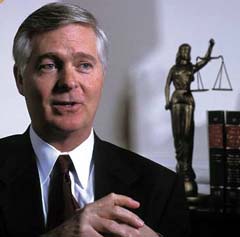
New
Messenger
Delivering Some
Familiar Themes
The following is the
condensed transcript of an interview conducted Dec. 4 by
Editor Steve Tuttle in the attorney general's conference
room:
Congratulations on your
election.
Thank you. I'm glad it's
over and I'm happy that we have six weeks to put together
an administration, counting Thanksgiving and Christmas.
It's been pretty hectic.
Why do you think you
won?
I believe the electorate
in North Carolina was focused on local issues and let the
national race take on a life of its own. The critical
issue to North Carolinians was education. They understand
that we have to improve public education in order to
improve the economy and the quality of life of the state.
And I think they felt like I was more committed to fixing
public education than my opponent.
How are you
prioritizing the tasks of putting together an
administration?
The first order of
business is to put together the governor's office itself,
your administrative staff and budget, communications and
legislative pieces. And that's what we're all working on
right now. After that you begin looking at the different
agencies and determining who will be the Cabinet
secretaries, who will (head) the boards and commissions.
But you have to get that good nucleus of those 30 to 40
people in the governor's office in place first.
You have expressed some
reluctance about moving your family into the Governor's
Mansion. Why?
Actually, the question
came up the day after the election. When I was asked,
“are you moving into the Governor's Mansion,”
the first thing I thought was I haven't discussed this
with my son, who is 15. And I just tried to deflect the
question until I could have an opportunity to discuss it
with him. I found out that he had already pulled up
(information about the Mansion) on the Internet, and his
comment to me was he didn't see a bedroom that looked
like his stereo would match it. We plan to make the move.
Right now, though, they are assessing the amount of
renovation they will have to do. They think it may take
10 months. I understand there is a problem with the HVAC
system.
What is your philosophy
about the state's role in economic development?
The state definitely has a
role, and that was the position I took when I argued the Maready
case, that government is involved whether intentionally
or not in the loss of many North Carolina jobs with NAFTA
and GATT, and the government has a role in helping
businesses expand to fill that void. So I do believe in
smart and targeted investments to recruit and expand
industry. I think that we do have to focus more on the
future and less on trying to retain the jobs we've had in
the past or even the present. I want to see us investing
more in information technology, not only in recruiting
new industry but also in preparing our workforce. Our
education system is going to have to perform better, our
standards will have to be higher and we're going to have
to use the community college system more in the future to
make certain that every citizen can participate in the
new economy. If we do that we can build a high-tech
economy for North Carolina, but we have to make that
commitment first.
Do you think the Bill
Lee Act, the state's centerpiece economic development
law, needs to be changed to accomplish those goals?
I believe the act does or
can do what it was intended to do, if we can get resolved
different interpretations by the Department of Revenue
and the Department of Commerce on what the rules are.
There is simply no valid reason for there to be a dispute
between those two agencies, and I will make sure they
work together. But beyond the Bill Lee Act, North
Carolina must be more innovative and we have to have more
flexibility in other areas in order to compete with even
our neighboring states. So I don't look at it so much as
a replacement of or an amendment to the Bill Lee Act as
much as I do a new interpretation, with more flexibility
options. There are a lot of ways to
create incentives without dealing with taxes. My first
preference always is investing in the workforce. We have
the system in place — the community college system
is a fantastic benefit to the state and is a great
economic development tool. So (my priorities are) first,
invest in your workforce; and second, invest in your
infrastructure. There are a lot of businesses and
industries that will do more here or will come here if
we're willing to do something about infrastructure —
roads, natural gas expansion, Internet access. (I also
believe that economic development policy should be)
performance-based rather than promise-based. We should
set up an economic development model based on what we
think the company can do and set targets for them to hit.
That way you know the state is getting it's money worth.
Would you clarify what
you mean about the disagreements between Commerce and
Revenue on the Bill Lee Act?
It's an SIC code issue.
Commerce takes the position that if you put a Family
Dollar Store in Hyde County, for example, the jobs are
created there, but Revenue takes the position the jobs
are created in Charlotte, where the company is based.
It's a disincentive to go into the rural areas where it
really should be an incentive. It's a more restrictive
interpretation by Revenue, and it's just a matter of
getting the two departments together.
What other practical
steps can the state take to boost economic development in
our rural counties?
The first thing we must do
is to recognize that our urban centers still have great
potential to grow and that they are the economic engine
that fuels economic growth across North Carolina. From
there you can extrapolate that we have to grow as one
state, not as two economies, otherwise the rural
economies will continue to lag and will be a drag on the
urban areas. Then you have to look at putting into place
Internet access for the entire state, a better system of
roads, equity in education. Education is the key,
especially in these rural areas that don't have the tax
base. They are in a downward spiral right now. Natural gas is important;
40 percent of the businesses we talk to won't locate
where there's not natural gas. Water and sewer will be
critical to a lot of the rural counties. We have to recognize that
we have only one driver, and that's the I-85 corridor.
Most of the new jobs created in the state have been in
the Triangle and Charlotte and they have been high-tech,
information technology jobs. It's been an investment in
the future that's brought these urban centers these
successes. But we don't have any driver in the east or
west, and the state can't continue to rely on just one
driver to develop the economy of the entire state. Our
neighbor to the south has recognized that and they're
moving (to create three economic development zones)
— along the Piedmont, along the coast as well as the
traditional (interstate corridors). You're seeing a lot
of that in other states and we need to get moving on that
here in North Carolina.
How could we create
such an economic driver for Eastern North Carolina?
Part of it is goes back to
the items we mentioned (earlier). Why is it that business
won't go to the east or the west or any of our 89 rural
counties? Every time (the answer) is going to be not just
infrastructure problems but a prepared workforce. I chair the Commission on
Business Laws and the Economy, something that I created,
What we found is we need to remove impediments (to
business growth). (That's why we created) the Business
Court so it's easier for businesses to get quick,
predictable answers to legal questions. That's going to
become more and more important. I have been in the board
rooms and talked to leaders about expanding here, even in
textiles. And we talk about what the state might be able
to do to encourage them and every time it comes back to a
prepared workforce. If you don't have a prepared
workforce you don't have enough incentive dollars in the
state to attract industry here. That's why I think
education will be the key not only on the K-12 level but
also in preparing the workforce after they're out of
school. We're going to have to do more of that, and
that's why it's so important that the (higher education)
bonds passed. Over the past several
years the state has channeled a great deal of its
business growth efforts through the seven regional
economic development commissions. What do you think of
that approach? I think it's important for
the regions to come together, to work for a particular
region rather than its own county or city interest. We've
seen a lot of turf battles that didn't need to exist
where you couldn't even conduct a meeting in one city
because people in another city wouldn't come. So
promoting regionalism is good in that sense. Having said
that, I think it's important for every region to
recognize that they are a part of the same state and
every region has to work together with the others. The Corporation for
Economic Development rated us “A” in 1997,
“A” in 1998 and “C” in 1999. In 1999
they cited our lagging rural economies. So Charlotte,
Raleigh, Greensboro are all getting hurt when Madison
County and Edgecombe are underperforming. So the state
has a role to play. Sometimes that role is just to get
out of the way.
Given the emphasis on
regionalism, does the state need to have a strong
Department of Commerce?
I want the state to have a
very aggressive Department of Commerce that is focused on
the future, that's focused more on research and
development. We lag behind most of the country in
research and development. I do think that, especially now
after Hurricane Floyd (and the other natural disasters
that have hit the state), it's going to take a central
authority to make certain that we bring those counties
together and to make certain we don't rebuild on the
mistakes of the past.
What's your view on the
range of issues collectively known as “smart
growth”?
I think it's about
creating choices for people in areas where they have
problems with urban sprawl. It's going to take a
commitment on the part of the local governing authorities
to control the growth. It's not something that we can do
out of Raleigh. That doesn't mean the state can't work
with the urban areas on transportation and other
infrastructure items. But it does mean the state can't
impose its will on the people in an urban area unless
they're willing participants. We've seen that example in
mass transit when it was floated in the Triangle. The
first group that didn't want to participate was the
airport, which pretty much shut it down. There are still
opportunities out there but you have to have Morrisville
talking to Cary and participating with Apex and Chapel
Hill and Durham and Raleigh.
Where does education
rank in your list of priorities?
It ranks No. 1, 2 and 3.
We are very fortunate in North Carolina that the business
community has always supported public education as
strongly as it has. We have been committed to it for
years and the last eight years we have made improvement
every year. But to make dramatic improvement we will have
to take some bold steps. We need to reduce class size in
K-3 to 18 and below and try to put together a program for
at-risk 4-year-olds. We know from all the data that (if
you do that) those students will perform better, not only
in K-3 but also throughout their career. That's something they
recognized out in California. They started losing
businesses in Silicon Valley and they started reducing
class sizes and they held on to those businesses. That is
the one way we know we can improve public education
dramatically. I think the people are ahead of the
politicians on this issue. I think the people will commit
to a plan that has a proven track record across the
county, of reducing class sizes, because they know that
it is an investment with a great benefit not only to the
quality of life of people but also to the economy.
How can the state
afford to reduce class size with the budget is as tight
as it is?
The state budget not only
is tight, we know we have a shortfall coming. The
question is how big the shortfall will be. There are
several options. One is that now that South Carolina has
passed a lottery, we now are the only state in the
country that plays the lottery and gives away the
proceeds. We're leaving three or four hundred million
dollars a year on the table that could be invested in
education, reducing class sizes, for pre-kindergarten
programs for at-risk 4-year-olds. With all these lottery
states surrounding us, we're the hole in the doughnut. Reducing class size can be
done in a number of ways. It's not just automatically
reducing every K-3 class to 18 or below. You can
prioritize within that system and either reduce (class
size) in low-performing schools or reduce (class size) in
core subjects. We have 40,000 teachers currently
certified who are not teaching. Many of them just wanted
to have a family but would love to teach two or three
periods a day. Bringing them back (would allow you to
take) two classes of 27 and make it three classes of 18
in reading, math and science. By recruiting back those
teachers (for such part-time duties), the cost would be
much less. If you just got the teachers and not the aides
you could reduce the class size for somewhere around $120
million. If you funded the entire
project (to hire enough full-time teachers to reduce K-3
class size to 18), it would run around $200 million. I think that's especially
important with the removal of social promotion, that we
make certain that we give every child an opportunity to
pass. Failing them does not make us successful. We know
achievement goes up with lower class sizes. We have a $7.5 billion
budget in education and within that budget there has to
be some funds available for this project, even if it's
just for (some additional teachers working part-time
teaching reading, math and science) to begin with.
Should Smart Start be
the vehicle for delivering the intervention services for
at-risk 4-year-olds that Judge Manning required in his
ruling in the Leandro case?
The Leandro case isn't yet
complete, and one question that hasn't yet been answered
is: who pays? We have to wait and see.
“At-risk” hasn't been defined, and I would
rather wait until we get the entire ruling. But we have
to recognize is that Smart Start and pre-kindergarten
academic programs are two different things. What we have
come to appreciate is that early childhood development is
critical, not only to education but to reducing crime and
other worthy social causes. I don't think you can replace
one program with the other and feel in good conscience
that you have done justice to the state's future.
So you believe that
it's just not practical or workable for Smart Start to
provide these services to at-risk 4-year-olds.
Smart Start does that in
some places. It gives some money to Bright Beginnings in
Charlotte and it certainly could be used as a tool. What
I would like to see the state move toward is a different
program for at-risk 4-years-olds that would be in
addition to (Smart Start). There could be some overlap
and those savings would come to the state to help run
both. I believe they are two different programs focused
on two different things. I would rather see the state
policymakers, legislators, State Board of Education,
making these decisions rather than judges. Judge Manning
is a good judge, a good friend, but the judiciary in
general is not trained or equipped to manage the school
system any more than the prison system.
How do you think
serving as governor will change you as a person?
I hope it doesn't. I've
been able to see myself mature throughout my adult career
and I think the most important thing is to see how so
many things are inextricably intertwined. If you want
lower crime, educate. I learned that at the DA's office. If you want economic
development, educate. If you want a higher quality of
life, educate. At the end of the day there's not any
single silver bullet that solves all our problems. That's
the challenge. And it will be the challenge in good
budget years and bad budget years. We will have to find
ways to be innovative and creative in the tough years. I hope at the end of four
years I can look back and see that we were aggressive,
that we improved education, that we reduced class size
and that we were able to develop economically in a smart
way for the future rather than replacing the jobs we're
losing with the jobs we know we're going to lose in three
or four years. If that happens I will be satisfied with
where I am.
COPYRIGHTED MATERIAL. This article first appeared in the January 2001
issue of the North Carolina magazine.
Return to magazine index
|
Meet Mike Easley,
politician
and family man
a personality profile
IN HIS
OWN WORDS
“I
think that we do have to focus more on the future and
less on trying to retain the jobs we've had in the past
or even the present. I want to see us investing more in
information technology, not only in recruiting new
industry but also in preparing our workforce. Our
education system is going to have to perform better, our
standards will have to be higher and we're going to have
to use the community college system more in the future to
make certain that every citizen can participate in the
new economy.”

When I was
asked, “are you moving into the Governor's
Mansion,” the first thing I thought was I haven't
discussed this with my son, who is 15. And I just tried
to deflect the question until I could have an opportunity
to discuss it with him."
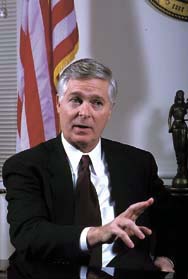
There are a
lot of businesses and industries that will do more here
or will come here if we're willing to do something about
infrastructure — roads, natural gas expansion,
Internet access.

We have to
recognize that we have only one driver, and that's the
I-85 corridor. Most of the new jobs created in the state
have been in the Triangle and Charlotte and they have
been high-tech, information technology jobs. It's been an
investment in the future that's brought these urban
centers these successes. But we don't have any driver in
the east or west, and the state can't continue to rely on
just one driver to develop the economy of the entire
state.
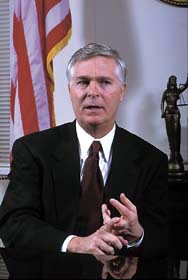
I have been in the board
rooms and talked to leaders about expanding here, even in
textiles. And we talk about what the state might be able
to do to encourage them and every time it comes back to a
prepared workforce. If you don't have a prepared
workforce you don't have enough incentive dollars in the
state to attract industry here.
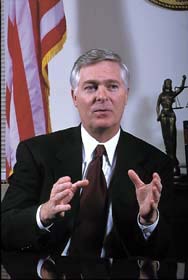
Now that South Carolina has
passed a lottery, we now are the only state in the
country that plays the lottery and gives away the
proceeds. We're leaving three or four hundred million
dollars a year on the table that could be invested in education.
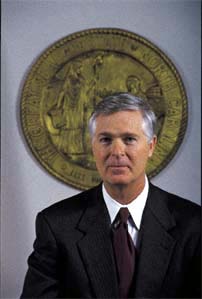
We will have to find
ways to be innovative and creative in the tough years. I hope at the end of four
years I can look back and see that we were aggressive,
that we improved education, that we reduced class size
and that we were able to develop economically in a smart
way for the future rather than replacing the jobs we're
losing with the jobs we know we're going to lose in three
or four years.
|

